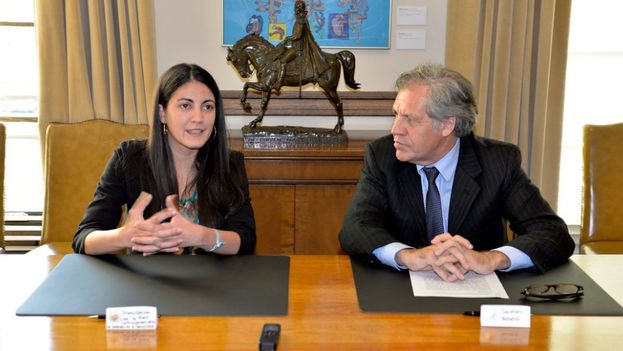
![]() 14ymedio, Havana, 22 February 2017 — The Secretary General of the Organization of American States (OAS), Luis Almagro, has published a letter explaining why he can not attend the Oswaldo Payá “Freedom and Life” Award ceremony. In the letter, addressed to Rosa Maria Paya, Almagro states that he will not come after the refusal of the Havana authorities to grant him an entry visa to Cuba.
14ymedio, Havana, 22 February 2017 — The Secretary General of the Organization of American States (OAS), Luis Almagro, has published a letter explaining why he can not attend the Oswaldo Payá “Freedom and Life” Award ceremony. In the letter, addressed to Rosa Maria Paya, Almagro states that he will not come after the refusal of the Havana authorities to grant him an entry visa to Cuba.
The Cuban consulate also denied Almagro entrance to the country using his Uruguayan passport, with which it would not need entrance visa.
According to the Secretary General of the OAS, an official of the Organization, Chris Hernández-Roy, was summoned to a meeting last Thursday by the Consul of Cuba in Washington and the First Secretary of the Consulate in which he expressed, also, the Cuban authorities’ surprise over the reason for the visit and its astonishment at the “involvement” of Almagro in anti-Cuban activities.
The award is not recognized by the Cuban State and the activities of Cuba Decide, an organization led by Rosa Maria Payá, “undermines the Cuban electoral system,” according to what they told the OAS.
For all these reasons, the authorities refused to grant Almagro a visa and warned him that he would not be admitted to the country if he attempted to board a flight bound for the island.
Almagro laments in his missive the “analysis as superficial as it is alarmist,” that has led to his visit being interpreted as a problem for relations with the United States
“We have responded to these arguments by pointing out that the only interest on our part has been, is and will be to facilitate Cuba’s rapprochement with the values and principles of the inter-American system, both as regards the defense of democracy and the promotion and respect for human rights, while expanding Cuba’s achievements in science, health and education to our region,” said Almagro.
Almagro laments in his missive the “analysis as superficial as it is alarmist,” that has led to his visit being interpreted as a problem for relations with the United States. He considers it “rather ridiculous” that bilateral relations between the two countries depend simply on the holding of the award ceremony.
He emphasizes, furthermore, that his presence on the island scheduled for Tuesday has nothing to do with a desire to evaluate the internal situation of Cuba or its political or ideological trends, issues on which he says he does not consider himself competent to give an opinion.
As Almagro writes in the letter, this is not the first time an act of this kind has been carried out in other countries of the region, and so, he says, he has made it known to the Cuban authorities. According to the secretary general of the OAS, these acts in other countries “are carried out without the government necessarily supporting them, but without censoring them, because they are part of the tolerance of democratic systems and values,” he argues.
His only concern, he says, is that he hopes that as a result of the Cuban government’s boycott of the Oswaldo Payá Award, there will be no repression of those who organized the event. “This would be absolutely unfair and undesirable,” he warns.
The Secretary General of the OAS also rejects the “criminalization” of Cuba Decides and notes that his intention was to honor the memory of Oswaldo Payá
Almagro argued that his presence and activities are not anti-Cuban “in any case” and, on the contrary, his interest is that the country develops at all levels, not forgetting the guarantee of all the rights of its citizens.
For that reason, the Secretary General of the OAS also rejects the “criminalization” of Cuba Decides and notes that his intention was to honor the memory of Oswaldo Payá, so he asked that the authorities reconsider their decision and allow him to enter the Island. “But that was not possible,” he laments.
Almagro closes his letter by reiterating to Rosa Maria Payá the high regard he has for her, in addition to his desire to “continue working within the framework of cooperation established between the Latin American Network of Youth for Democracy,” of which she is the current president, “and the OAS.”
The relationship of the Secretary General of the OAS with the Cuban Government has gone through distinct phases. In November of 2014 Almagro visited the Island for fourth time, in his role foreign minister of the Republic of Uruguay. On that occasion he was interviewed by Cuban Foreign Minister Bruno Rodríguez. However, on assuming his current position in the OAS he became a frequent target of criticism in the official press.
In 2009 the OAS lifted the suspension that weighed on the Island and supported its eventual rejoining
The OAS and the Government of the Island have had tense encounters for decades, since the country was excluded from the regional organization in January 1962, after defining its Marxist-Leninist course. In 2009 the OAS lifted the suspension that weighed on the Island and supported its eventual rejoining of the organization.
Almagro reiterated the invitation to Havana in early 2016 when he stated that his heart felt that Cuba “should be back” in the body, although his brain indicated that the process “will not go that fast.”
During a meeting of the Association of Caribbean States held in Havana, President Raúl Castro reiterated that “the OAS from its foundation was, is and will be an instrument of imperialist domination and that no reform could change its nature or its history. Cuba will never return to the OAS. ”
